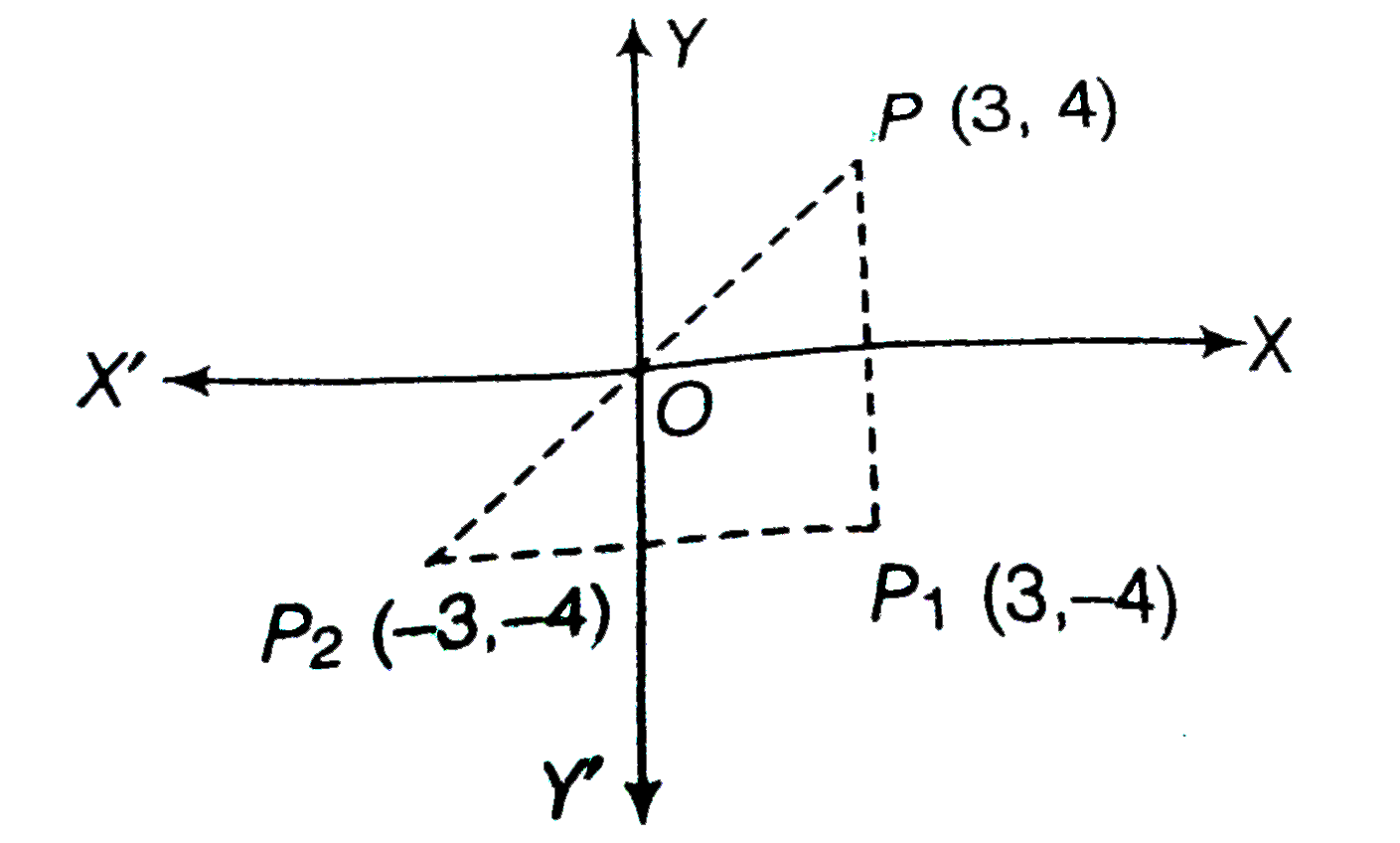The point undergoes a reflection in the X-axis followed by a reflection in the y-axis. Show that their combined effect is the same as the single reflection of p(3,4) in the orign. Solution in Punjabi
let be the image of p (3,4) after reflection in the X-axis then,
therefore, the image of p(3,4) after reflection in the X-axis is (3,4)

Now, let be the image of after reflection in the y-axis, then
therefore the image of after reflection in the Y-axis is be the image of in the origin O. then
therefore the image of after reflection in the origin is . It is clear that
Hence, the image of of often successive reflection in their X-axis and Y-axis is the same as , which is single reflction of p in the origin.
Topper's Solved these Questions
- MATRICES Book:ARIHANT MATHSChapter:MATRICES Exercise:Exercise For Session 1
Explore 9 Videos
- MATRICES Book:ARIHANT MATHSChapter:MATRICES Exercise:Exercise For Session 2
Explore 19 Videos
- MATHEMATICAL INDUCTION Book:ARIHANT MATHSChapter:MATHEMATICAL INDUCTION Exercise:Exercise (Questions Asked In Previous 13 Years Exam)
Explore 2 Videos
- MONOTONICITY MAXIMA AND MINIMABook:ARIHANT MATHSChapter:MONOTONICITY MAXIMA AND MINIMAExercise:Exercise (Questions Asked In Previous 13 Years Exam)
Explore 31 Videos
Similar Questions
If A=∣∣∣α22α∣∣∣and|A|3=125 , then the value of α is a.±1 b. ±2 c. ±3 d. ±5
View SolutionIf A=[4x+22x−3x+1] is symmetric, then x =
View SolutionIf t₁+t₅+t15+t₁₀+t₂₀+t₂₄=225 Find the sum of first 24th term of that A.P?
View SolutionThe least value of α∈R for which 4ax2+1x≥1, for all x>0, is
View SolutionIf points Q and R reflections of point P(−3, 4) in X and Y axes respectively, what is QR ?
View SolutionA ray of light leave the point (3,4) reflects off the y-axis towards x-axis and again after reflection from x-axis finally arrives at the point (8,2) then the abscissa of point where the reflected ray meets x-axis and the ordinate of point where the refleced ray meet y-axis is
View SolutionFind the reflection of a point (3,4) in line x=−2
View SolutionA point P is reflected in the x - axis . Co - ordinates of its image are (8,-6).
Find the co - ordinates of the image of P under reflection in the y - axis.
View SolutionA point P is reflected in the x-axis. Co-ordinates of its image are (-4, 5).
Find the co-ordinates of the image of P under reflection in the y-axis.
View SolutionA point P is reflected in the origin. Co-ordinates of its image are (-2, 7).
Find the co-ordinates of the image of P under reflection in the x-axis.
View SolutionThe point P(a, b) is first reflected in the origin and then reflected in the y-axis to P'. If P' has co-ordinates (4, 6), evaluate a and b.
View SolutionThe point P(x, y) is first reflected in the x-axis and then reflected in the origin to P'. If P' has co-ordinates (-8, 5), evaluate x and y.
View SolutionA point P (a, b) is reflected in the x-axis to P'(2, -3). Write down the values of a and b. P" is the image of P, reflected in the y-axis. Write down the co-ordinates of P". Find the co-ordinates of P", when P is reflected in the line, parallel to y-axis, such that x = 4.
View SolutionThe point P(3, 4) is reflected to P' in the x-axis, and O' is the image of O (the origin) when reflected in the line PP'. Write :
the perimeter of the quadrilateral POP'O'
View SolutionThe reflection of the point (-3,4) in the line x−y=0 is
View SolutionFind the reflection of the point P(3,4) in the following using the transformation of matrices :
x - axis
View Solution